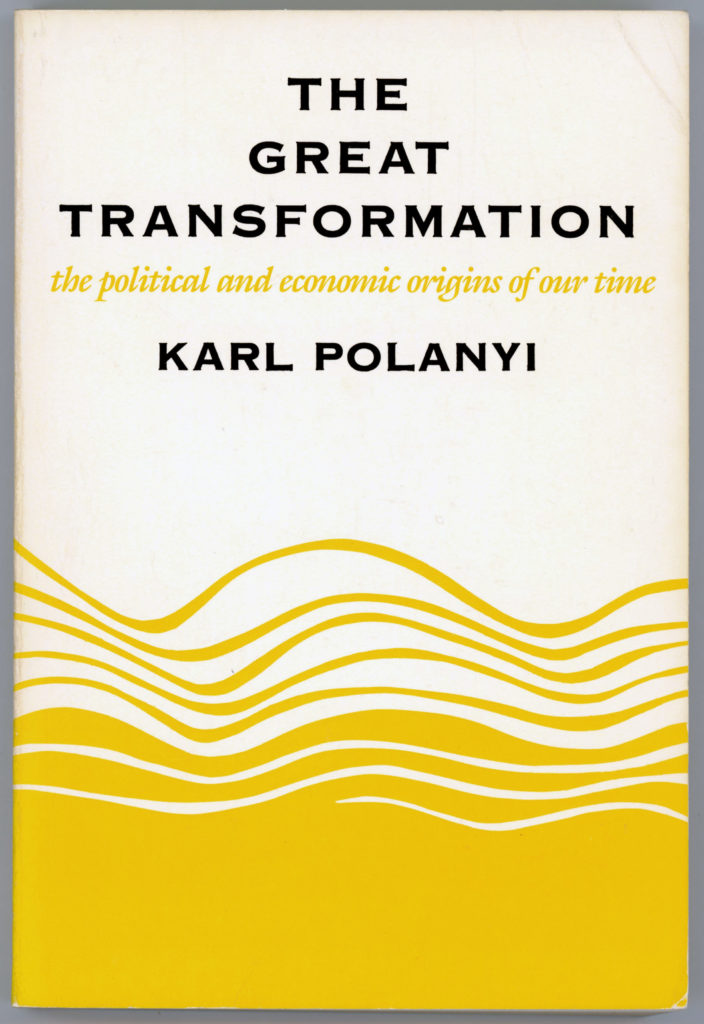The Great Transformation – The Political and Economic Origins of Our Time
by Karl Polanyi
Beacon Press – 1957
____________________
“To allow the market mechanism to be the sole director of the fate of human beings and their natural environment, indeed, even of the amount and use of purchasing power, would result in the demolition of society.”
“A blind faith in spontaneous progress had taken hold of people’s minds, and with the fanaticism of sectarians the most enlightened pressed forward for boundless and unregulated change in society.“
 Our thesis is that the idea of a self-adjusting market implied a stark utopia. Such an institution could not exist for any length of time without annihilating the human and natural substance of society; it would have physically destroyed man and transformed his surroundings into a wilderness. (3)
Our thesis is that the idea of a self-adjusting market implied a stark utopia. Such an institution could not exist for any length of time without annihilating the human and natural substance of society; it would have physically destroyed man and transformed his surroundings into a wilderness. (3)
All types of societies are limited by economic factors. Nineteenth century civilization alone was economic in a different and distinctive sense, for it chose to base itself on a motive only rarely acknowledged as valid in the history of human societies, and certainly never before raised to the level of a justification of action and behavior in everyday life, namely, gain. (30)
Yet, but for the consistently maintained policy of the Tudor and early Stuart statesmen, the rate of that progress might have been ruinous, and have turned the process itself into a degenerate instead of a constructive event. For upon this rate, mainly, depended whether the dispossessed could adjust themselves to changed conditions without fatally damaging their substance, human and economic, physical and moral; whether they would find new employment in the fields of opportunity indirectly connected with the change; and whether the effects of increased imports induced by increased experts would enable those who lost their employment through the change to find new sources of sustenance. (37)
The Industrial Revolution was merely the beginning of a revolution as extreme and radical as ever inflamed the minds of sectarians, but the new creed was utterly materialistic and believed that all human problems could be resolved given an unlimited amount of material commodities. (40)
Ultimately, that is why the control of the economic system by the market is of overwhelming consequence to the whole organization of society: it means no less than the running of society as an adjunct to the market. Instead of economy being embedded in social relations, social relations are embedded in the economic system. (57)
To allow the market mechanism to be the sole director of the fate of human beings and their natural environment, indeed, even of the amount and use of purchasing power, would result in the demolition of society. For the alleged commodity “labor power” cannot be shoved about, used indiscriminately, or even left unused, without affecting also the human individual who happens to be the bearer of this peculiar commodity. In disposing of a man’s labor power the system would, incidentally, dispose of the physical, psychological, and moral entity “man” attached to that tag. Robbed of the protective covering of cultural institutions, human beings would perish from the effects of social exposure; they would die as the victims of acute social dislocation through vice, perversion, crime, and starvation. Nature would be reduced to its elements, neighborhoods and landscapes defiled, rivers polluted, military safety jeopardized, the power to produce food and raw materials destroyed. … Undoubtedly, labor, land, and money markets are essential to a market economy. But no society could stand the effects of such a system of crude fictions even for the shortest stretch of time unless its human and natural substance as well as its business organization was protected against the ravages of this satanic mill. (73)
A blind faith in spontaneous progress had taken hold of people’s minds, and with the fanaticism of sectarians the most enlightened pressed forward for boundless and unregulated change in society. (76)
As long as a man had a status to hold on to, a pattern set by his kin or fellows, he could fight for it, and regain his soul. (99)
The traditional unity of a Christian society was giving place to a denial of responsibility on the part of the well-to-do for the conditions of their fellows. The Two Nations were taking shape. To the bewilderment of thinking minds, unheard-of wealth turned out to be inseparable from unheard-of poverty. Scholars proclaimed in unison that a science had been discovered which put the laws governing man’s world beyond any doubt. It was at the behest of these laws that compassion was removed from the hearts, and a stoic determination to renounce human solidarity in the name of the greatest happiness of the greatest number gained the dignity of a secular religion. (102)